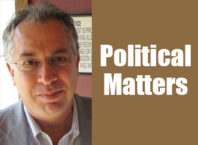By Mordecai Specktor
Putting Columbus back on a pedestal
The idea for this column – when it began back in the mists of time – was to shed light on government policies affecting Native people. On the state level, there was a doozy of a proposal last month.
On March 17, Sen. Bill Ingebritsen, R-Alexandria, introduced a bill in the Minnesota Senate’s State Government and Finance Committee that would put the Christopher Columbus statue back on it pedestal by the Capitol.
“Rioters do not dictate the policies of our state, nor do their opinions and beliefs represent the views of every Minnesotan,” Ingebrigtsen said in a news release, which was reported in the Alexandria Echo Press.
The 69-year-old lawmaker added, regarding his measure to restore the Columbus statue: “This is public property, and it belongs to everyone. Minnesota has clear procedures that everyone in this state needs to abide by, whether you’re on the right or the left. This legislation sends a message to those who want to do damage and cause harm that we’re not going to stand for that, and we’re not going to allow mob rule.”
Native protesters toppled the Columbus statue on June 10, 2020. The action took place as statues of Confederate generals and other despicable historical figures were being pulled down around the country, in the aftermath of the police killing of George Floyd, on May 25, 2020, in South Minneapolis. The Floyd killing was followed by nights of civil unrest that saw a large swath of East Lake Street looted and torched; and it inspired a mass movement calling for racial justice across the United States and around the globe.
When the horrible year 2020 began, we didn’t expect that Minneapolis would become the epicenter of a worldwide racial reckoning, but that’s what happened.
(As I write this, opening arguments in the trial of former Minneapolis cop Derek Chauvin are set to begin in the fortified Hennepin County Government Center. Chauvin, who is white, has been charged with three counts of murder and manslaughter for keeping his knee on Floyd’s neck for more than nine minutes, choking the life out of the 46-year-old Black man.)
Getting back to the case of the toppled statue honoring the 15th century Genoese explorer and predator, many people were involved in the action at the Capitol, but only Mike Forcia, the chairman of AIM Twin Cities, was charged with a crime, felony criminal damage to property.
“According to the Minnesota Bureau of Criminal Apprehension, the investigation led to a 13,000-page file identifying Mike Forcia as the primary organizer, leader, and executor of the incident,” Native News Online reported. “Forcia is an enrolled citizen of the Bad River Band of Lake Superior Chippewa and lifetime activist for Indigenous rights and people. Although Forcia is seen cheering as the statue was toppled, there is no footage of him pulling the statue down.”
Last December, Ramsey County District Court Judge Leonardo Castro accepted a plea deal between the State of Minnesota and Mike Forcia, who was represented by attorney Jack Rice, that stayed imposition of a felony sentence in exchange for Forcia performing “100 hours of community service through teaching and education,” according to Native News Online.
The proposal by Sen. Ingebritsen to put the Columbus statue back in its spot reflects Republican efforts to focus on so-called “cancel culture.” Basically, GOP elected officials have no cogent policy proposals to deal with vexing social problems. Instead they’ve decided to prioritize saving Mr. Potato Head and Dr. Seuss books – when they’re not busy trying to keep Black people, and Native people living on reservations, from voting. The Republican Party has become in thrall to Donald Trump, parroting his big lie about the 2020 presidential election being stolen, which incited the Jan. 6 Stupid Coup at the U.S. Capitol, where five people died.
For his part, Mike Forcia strongly takes issue with Ingebritsen’s proposal. In an exchange of messages in late March, Forcia told me that “white supremacists or their supporters should not dictate state policy. And, by the way, we were peaceful protesters doing an act of civil disobedience. Not a mob,” in reference to Ingebritsen’s characterization of the Native group that took action on June 10.
And Forcia said he reached out to Ingebritsen, left a message saying that he had “100 hours of community service educating the public about Columbus and genocide and that maybe [Ingebritsen] could set it up so I could speak to the legislators, because obviously they need a big history lesson as well.”
Forcia said, “He hasn’t gotten back to me yet.”





